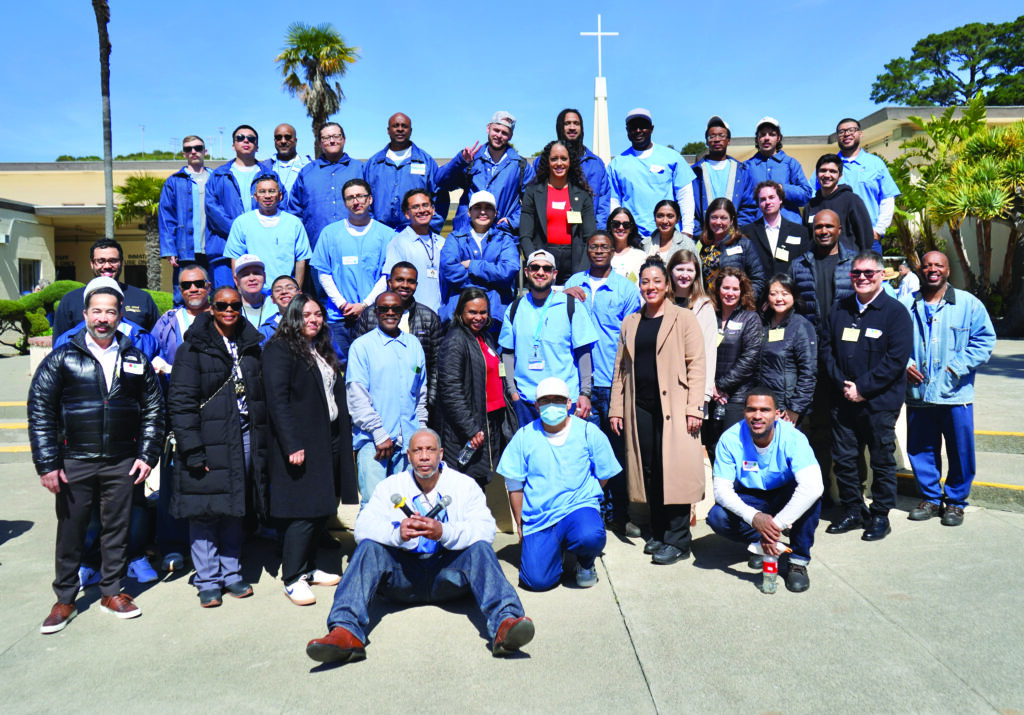
Members of the Youth Offender Program at San Quentin met with San Francisco District Attorney Brooke Jenkins and other members of her office to discuss preventive measures dealing with the juvenile to prison pipeline.
“Only thing I can remember is thinking how much I want my momma,” said Jarvis Garner Jr., who at 14-years-old sat in an interrogation room and took a deal for 55-years-to-life with two strikes.
Following in the tradition of San Quentin News–style symposiums, residents named their victim(s), sentence length, and commitment offense during introductions.
The vulnerability of the incarcerated people allowed outside guests to hear the accountability directly from the offender, but also the extreme bias of sentencing laws handed down to juveniles who sometimes spend large chunks of their lives behind bars in both juvenile and adult prison facilities.
San Francisco District Attorney Brooke Jenkins said the goal of their March 18 visit was to discuss some of the challenges with resentencing and ways to cut off the pipeline that leads juveniles to adult prisons.
“It is not always easy to say that you will sit in the room with the district attorneys, but I always leave with ideas to fix the broken [legal] system,” Jenkins said.
SQNews’s Vincent E. O’Bannon hosted the forum and held a moment of silence for victims all around the world before attendees divided into six small groups of three outside guests and seven residents.
As resident Garner Jr. talked about his childhood, he said one thing that would have deterred him from crime would have been protection and guidance.
“The one thing that sticks out for me during that time is loneliness,” said Garner. “I’m here to help someone who may possibly find themselves in my situation at age 13 or 14 years old.”
Resident Diego Nava discussed his experience with incarceration and said that his first run-in with the law resulted in an ankle monitor and house arrest.
“There should have been more pressure placed on my parents; something might have changed,” said Nava. “Even if they would not have told the truth about what was happening [at home], but it would have pressured them to put more pressure on me.”
Attorney Stacie Pettigrew said that her perspective changed after she prosecuted several murder cases.
“In most of my cases, you reach a point where you believe that, based on the conduct, [a person] should be in prison,” said Pettigrew. “One of the things I strive for is seeing people as people and not just another case.”
Austin Hogan is a member of the Youth Offender Program. He said he has always wanted to help people, but after everyone who really cares about him left, he decided that it was time to change. He said he would like district attorneys to know that rehabilitation is real.
“My priorities are realigned because this isn’t my life and I’m not a prisoner,” Hogan said. “We’re going to have good minutes and bad hours, good days and bad weeks, but have the courage to make the right choice for yourself.”
District Attorney Jenkins noted the benefit of talking with the incarcerated people. She said there is always going to be something good that comes from these discussions, like the two proposed bills: single cell occupancy and paying off restitution. Those were the result of talking with incarcerated residents in the Civic Engagement Group at San Quentin.
“Because we are in charge of the sentencing, we can fix the time people are given,” Jenkins said. “We have to start off small, but hopefully the bills get passed.”